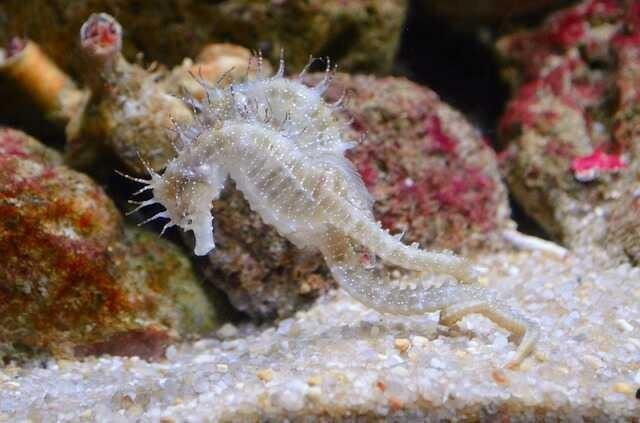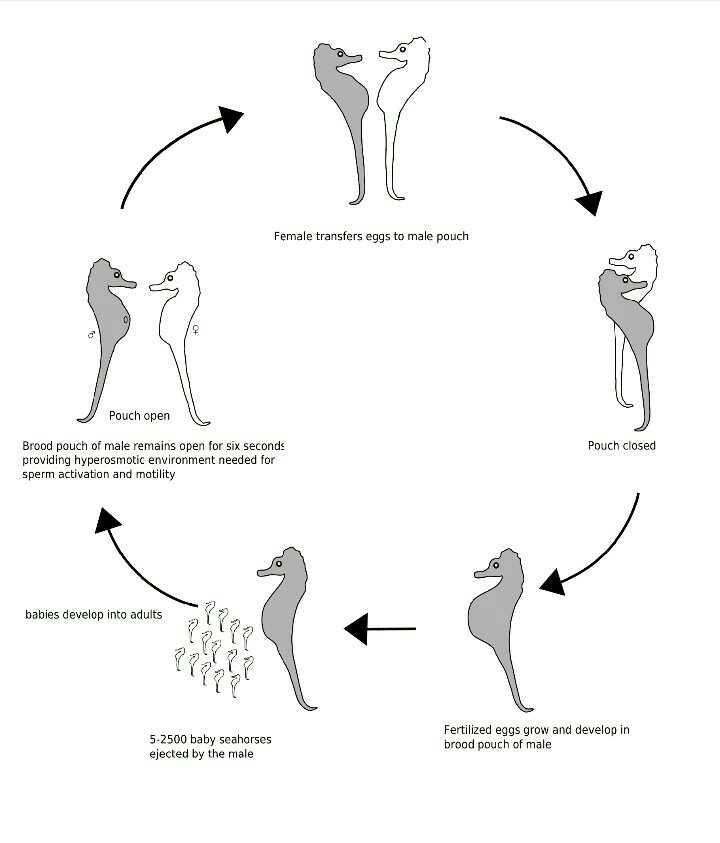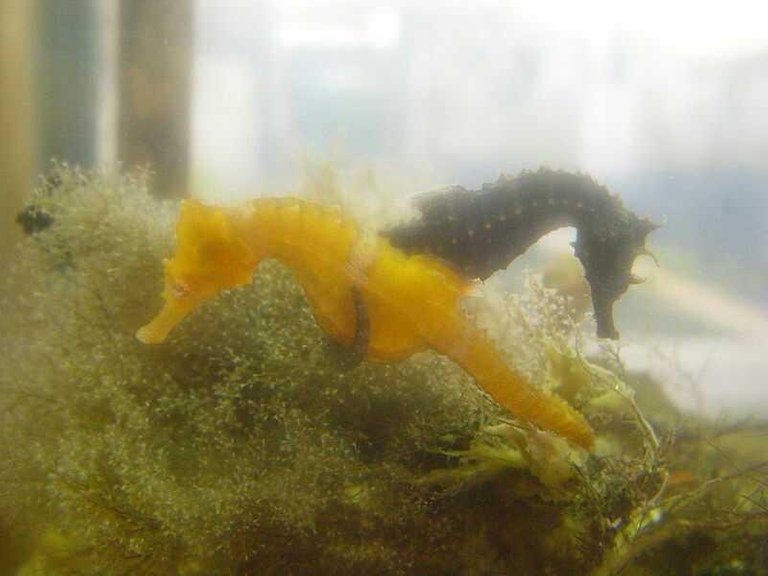I wouldn't be wrong if I should say some pregnant women wished their husbands were the ones who are pregnant while they go back to live their normal lives. I wouldn't blame them for that. Who wouldn't want to save themselves from some stress and pain that comes with childbirth? I can imagine the stress they would be going through. Pains and discomfort in their body and also a need to find new clothes because of their bulging belly.
Well, their wishes may not come through but for some particular animals, this is their reality. Where the males get pregnant and the females go back to their daily lives. I am talking about the seahorses. In one of my previous posts, I explained that seahorses are fish and not horses that live inside water. Although their head and their neck appear to be like that of the horse's they are as equal to a fish as the tilapia, Salmon, catfish etc.
They are not horses that live inside water
 CCO Creative Commons: pixabay
CCO Creative Commons: pixabay
They belong to the class of animals known as Actinopterygii. You'll find all the other bony fishes in this same class too. The males are differentiated by the presence of a pouch on their ventral side. What got me interested in this animal is their unique reproductive characteristics. The males get pregnant which is not what you may likely come across in most other animals.
How do the males get pregnant?
 reproduction cycle of the seahorse:public domain
reproduction cycle of the seahorse:public domain
A study conducted on a species of seahorse, the dwarf seahorse, to find out how the male pregnancy takes place. It was found out that the process starts with a courtship which lasts through about four phases. During the period, the fish displays distinct behaviors such as attaching their tails in the same branch of leaves, vibrations and also assume bright coloration. The first phase which marks the start of the process starts some days before the male gets pregnant while the last phase occour on the last day of the courtship.
The first phase which the called "reciprocal quiver" initiates the process. The prospective pairs start very early in the morning. They whisper love in a way different from humans. They communicate love by standing adjacent to each other and the male quiver while the female responds by doing the same. The female changes the position of her grip on the branch to create a movement. A colour change is also accompanied by this process. A bright colour to mark their friendship. Maybe something similar in humans will be blushing. This courtship behavior continues every morning until the last day of the courtship when they move to another courtship phase.
Phase 2 is called "pointing-pumping". Courtship starts earlier this day as the 2 other phases will also take place the same day. The female is seen in a pointing position toward the male. The male reacts to this by bending away and then vibrating. The female does not become brightly coloured in this phase.
Phase 3 is called "pointing-pointing". Just as the name, this phase is different from phase 2 because the male responds by pointing back instead of leaning away. In this phase, both fish assume a bright colouration and the end of this phase is usually marked by the departure of the male.
 male and female during courtship: Creative Commons
Attribution-Share Alike 3.0 Unported
male and female during courtship: Creative Commons
Attribution-Share Alike 3.0 Unported
What happens in the male's pouch?
The male fertilizes the eggs in its pouch by releasing the sperm. During the courtship, when the male fish open its pouch for the female to deposit the eggs it also takes on seawater. This allows for a suitable environment for the development of the embryo. The male releases nutrients into the pouch which the embryo uses for their development. Also, the male pouch helps to excrete the waste product of the embryo and supply oxygen too. The pouch acts like a womb or, more precisely, an incubator for the survival of the embryo.The number of days the eggs spend in the pouch varies between a week to 4 weeks depending on the species, which according to project-seahorse there are 44 Species of seahorses. The male seahorse goes into labour, usually, at night birthing the young live from its pouch. It does this by contrasting its muscles and "sneezing" the young life fish out. Sneezing may not be the right word to use but the process looks similar. I've got a video from National Geographic YouTube channel showing how a male seahorse gives birth.
After giving birth to the young, the daddy seahorse does not take any other parental responsibility neither does the mother. The young are born independent and they have to start feeding for themselves. The seahorse is ready to get pregnant again few hours after that or few days depending on the females.
Why would a male want to get pregnant?
Could this be one of the things males do for love? Or because "daddy" seahorses so much love their darling females they don't want them to experience the stress of pregnancy? This question has been a topic of interest for various researchers but from their various results, one can't conclusively give a reason.
Some researchers suggested that the male seahorse carries the egg during the period of fertilization to reduce the total cost of energy demand on the female. Saving that energy from the female will probably give more chance to more production. Also, another hypothesis is that the male gets pregnant to speed up the whole process. Getting pregnant will give the female more time to recover and produce more eggs.
There was a popular belief that the seahorses are faithful partners with a male and female staying together for better for worse. But contrary to that opinion that all mating pairs stick together for life, this article show that to be false.
Thanks for reading to the end, I hope to bring you another interesting read very soon.
Hello! I find your post valuable for the wafrica community! Thanks for the great post! We encourage and support quality contents and projects from the West African region.
Do you have a suggestion, concern or want to appear as a guest author on WAfrica, join our discord server and discuss with a member of our curation team.
Don't forget to join us every Sunday by 20:30GMT for our Sunday WAFRO party on our discord channel. Thank you.
Thanks for using eSteem!
Your post has been voted as a part of eSteem encouragement program. Keep up the good work! Install Android, iOS Mobile app or Windows, Mac, Linux Surfer app, if you haven't already!
Learn more: https://esteem.app
Join our discord: https://discord.gg/8eHupPq
Congratulations @mr-aaron! You have completed the following achievement on the Steem blockchain and have been rewarded with new badge(s) :
Click here to view your Board of Honor
If you no longer want to receive notifications, reply to this comment with the word
STOPThis post has been voted on by the SteemSTEM curation team and voting trail in collaboration with @curie.
If you appreciate the work we are doing then consider voting both projects for witness by selecting stem.witness and curie!
For additional information please join us on the SteemSTEM discord and to get to know the rest of the community!